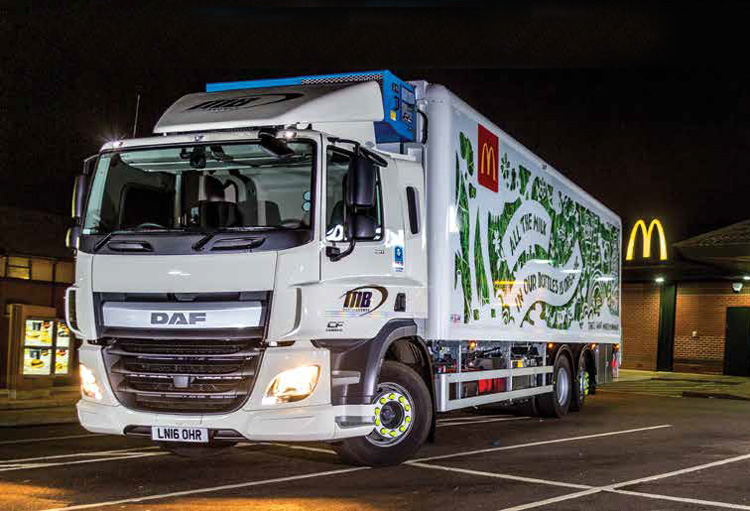
FORS to launch new Practitioner workshop to help minimise noise.
FORS Professional is introducing a new Practitioner workshop, designed to help managers better understand how their operations can minimise incidental driving and delivery noise when working in urban environments. With the FORS Standard now including a noise assessment at Gold, this new workshop has been set up to give members the tools they need to put noise assessment into practice.
Along with understanding the issues and policies around noise in urban areas, the new FORS Professional Managing noise in logistics workshop will give attendees practical advice on how to reduce the impact of noise from freight deliveries in urban environments, the benefits of being quiet, and guidance on how to assess and mitigate the impact of noise and reduce incidental delivery noise.
The workshop will be the 10th in the FORS Practitioner series, and from 1st January 2018, members must complete all 10 in order to become a FORS Practitioner.
The draft London Environmental Strategy*, under consultation since August 2017, sets reducing the impact of transport noise as a priority, noting almost 2.4 million people are exposed to road traffic noise levels which are above World Health Organisation (WHO) recommendations of 55dB. Anne Johnson, Operations Director at FORS said this new half-day workshop should help identify ways to mitigate against unintentional noise, made at the point of loading, for example in yards close to housing, throughout the delivery journey, and when driving in quieter or less busy times.
Anne said: “It goes without saying that a certain amount of noise is created when conducting business, and although some noise cannot be avoided, there are many ways operators can help reduce noise impact and minimise disruption in urban areas.”
“Quieter equipment is obviously a huge factor, but we want to give Practitioners insight into how they can help further, both in operational management and via best driving practices.”
“The subjects covered will be very much focused on practical application, we want operators to come away with the tools they need to put quieter deliveries into practice.”
The workshop is part of a suite of guidance on offer to operators and drivers, in partnership with Transport for London (TfL), including a manager’s pack, and the Quiet Equipment Guide, which is currently available on the FORS and TfL websites.
Jaz Chani, Freight and Fleet Project Manager at TfL said: “Reducing the impact of noise on urban streets is a key part of the environmental programme for London, and we hope this new range of guidance will help hauliers understand how they can help.”
The impact of noise on urban streets is a key part of the programme for London
The WHO** classifies environmental noise as the second largest environmental health risk in Western Europe, estimating at least one million healthy life years are lost every year from traffic related noise in the western part of Europe.
In the UK, a 2013 Government report into the economic impact of noise pollution quantifies the impact of road traffic noise, with costs in England alone £7 to 10 billion, figures akin to the impact of road collisions (£9 billion).***
The workshop has been ratified by the Noise Abatement Society, who has been instrumental in the course programme development.
Lisa Lavia, Managing Director at the Noise Abatement Society said: “Rapid urbanisation is driving the demand for vibrant, exciting 24/7 cities, yet places where peace and calm still exist.
“Quiet, safe, and clean retimed delivery and servicing activity is crucial to help residents get essential goods and services in a timely manner. We applaud FORS Gold members, and those aspiring to achieve the accreditation, for their commitment to residents and the environment in the context of sustainable growth.”
Due to launch in December 2017 the funded workshops will be offered nationwide. Each workshop will be delivered by FORS trainers, qualified in health, safety and environmental practice and management, who are members of the Chartered Institute of Environmental Health (CIEH), and British Safety Council trained.
Anne Johnson said it is important that members are able to share knowledge gained on the workshop with customers and clients. Anne commented: “Responsibility for managing noise is something which all those involved in urban logistics must share, from drivers and operators to yard managers, customers and their clients. If customers understand how noise impacts their immediate environment, they can then work with drivers and logistics partners to better manage deliveries to factories and yards, and reduce noise.
“We hope this workshop helps address the problems of urban noise and deliveries, and puts FORS members in the best possible position to reduce incidental noise where they can to create a quieter urban environment.”
**Burden of disease from environmental noise
***Noise pollution: economic analysis
Noise assessment part of FORS Gold Standard
The FORS Standard requires operators wishing to become Gold accredited to meet the G8 Noise requirement to reduce noise pollution. G8 requires you to demonstrate measures taken to reduce noise pollution The criteria includes documenting how operators:
- Reduce noise during driving, parking, loading or unloading, servicing or vehicle washing, relevant to vehicle type, load and sector
- Detail noise produced by vehicles, processes, vehicle equipment and drivers and show how this information is shared with all relevant employees
- Regularly evaluate overall noise level reduction when specifying equipment to be fitted to a new vehicle
- Evaluate site reports showing regular customer locations and long-term operational sites, and details of potential and predicted noise pollution
- Explore timed deliveries to take place outside of peak times and sensitive nighttime or very early hours
- Silencing of radios and refrigeration units, limiting the use of the horn, the use of quiet flooring and the fitment of white noise alarms
- Noise produced by staff and drivers at their premises, including gates, bays, shutters –to reduce as much as noise as possible from operational activities



